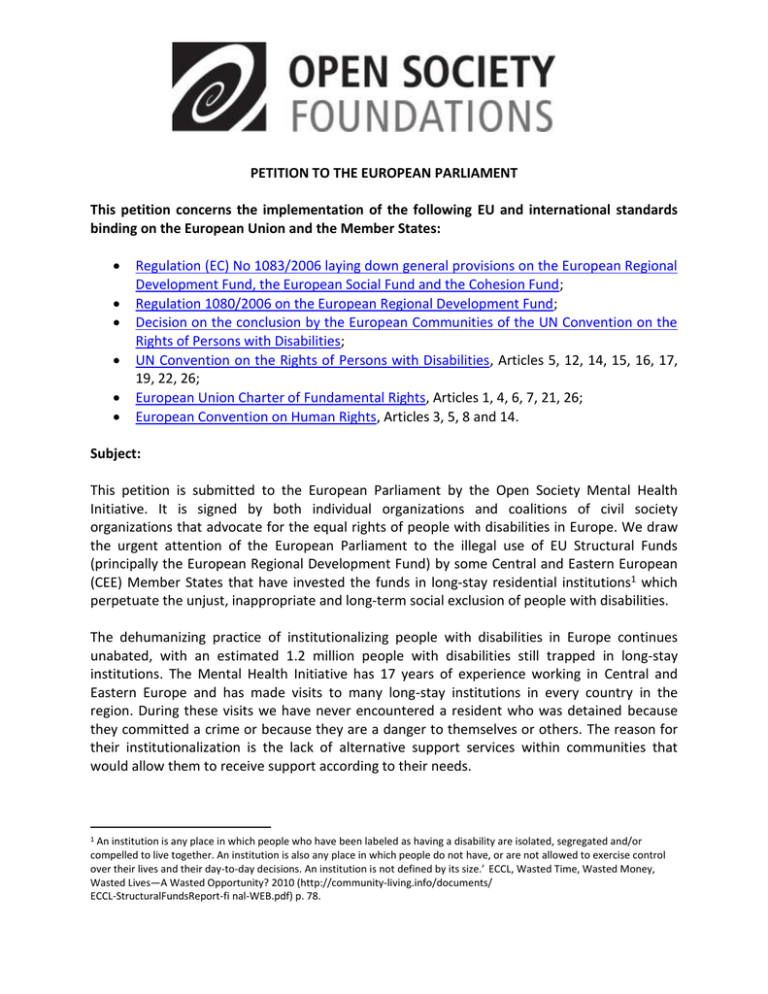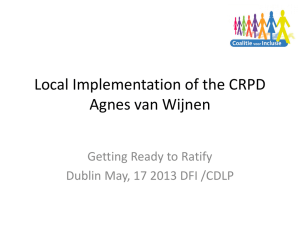PETITION TO THE EUROPEAN PARLIAMENT
advertisement

PETITION TO THE EUROPEAN PARLIAMENT This petition concerns the implementation of the following EU and international standards binding on the European Union and the Member States: Regulation (EC) No 1083/2006 laying down general provisions on the European Regional Development Fund, the European Social Fund and the Cohesion Fund; Regulation 1080/2006 on the European Regional Development Fund; Decision on the conclusion by the European Communities of the UN Convention on the Rights of Persons with Disabilities; UN Convention on the Rights of Persons with Disabilities, Articles 5, 12, 14, 15, 16, 17, 19, 22, 26; European Union Charter of Fundamental Rights, Articles 1, 4, 6, 7, 21, 26; European Convention on Human Rights, Articles 3, 5, 8 and 14. Subject: This petition is submitted to the European Parliament by the Open Society Mental Health Initiative. It is signed by both individual organizations and coalitions of civil society organizations that advocate for the equal rights of people with disabilities in Europe. We draw the urgent attention of the European Parliament to the illegal use of EU Structural Funds (principally the European Regional Development Fund) by some Central and Eastern European (CEE) Member States that have invested the funds in long-stay residential institutions1 which perpetuate the unjust, inappropriate and long-term social exclusion of people with disabilities. The dehumanizing practice of institutionalizing people with disabilities in Europe continues unabated, with an estimated 1.2 million people with disabilities still trapped in long-stay institutions. The Mental Health Initiative has 17 years of experience working in Central and Eastern Europe and has made visits to many long-stay institutions in every country in the region. During these visits we have never encountered a resident who was detained because they committed a crime or because they are a danger to themselves or others. The reason for their institutionalization is the lack of alternative support services within communities that would allow them to receive support according to their needs. 1 An institution is any place in which people who have been labeled as having a disability are isolated, segregated and/or compelled to live together. An institution is also any place in which people do not have, or are not allowed to exercise control over their lives and their day-to-day decisions. An institution is not defined by its size.’ ECCL, Wasted Time, Wasted Money, Wasted Lives—A Wasted Opportunity? 2010 (http://community-living.info/documents/ ECCL-StructuralFundsReport-fi nal-WEB.pdf) p. 78. Institutionalization is an egregious violation of human rights and is a serious problem in many CEE countries. People living in institutions are isolated, often abused, and denied basic rights like the rights to education and employment, and the right to make decisions about their lives. Institutionalization denies people their fundamental right to live in the community as equal citizens. In the last decade or so, numerous reports concerning institutions in CEE have depicted appalling living conditions—such as lack of heating, malnutrition, inadequate clothing, unhygienic sanitation, physical and sexual abuse, lack of privacy, and little to no rehabilitative or therapeutic activities. Many such institutions are located in isolated areas and residents have little to no contact with the outside world. The rigid regime in institutions takes no account of individual needs or preferences, and forcing people with disabilities to live in institutions prevents them from developing and maintaining relationships with their family, friends and the wider community, and is in direct conflict with the right to community living as set out in CRPD Article 19. The segregation from society that institutionalization causes is in itself a human rights violation and is in direct contravention of EU policies on social inclusion. Investment of Structural Funds to perpetuate this situation is contrary to EU law2. The rights of people with disabilities are guaranteed under the Charter of Fundamental Rights, the CRPD (which the EU is bound by), and the European Convention on Human Rights (which the EU must comply with according to Article 6(3) of the Treaty on European Union). Namely: the right to liberty or freedom from arbitrary detention (CRPD Article 14, ECHR Article 5, CFR Article 6), the right to freedom from inhuman or degrading treatment or punishment (CRPD Article 15, ECHR Article 3, CFR Article 4), the right to respect for private and family life (CRPD Article 22, ECHR Article 8, CFR Article 7), the right to live independently (CRPD Article 19, CFR Article 26), and the prohibition on discrimination on grounds of disability (CRPD Article 5, ECHR Article 14, CFR Article 21). The EU, and the Member States when implementing EU law - which includes the use of Structural Funds under EU legislation - are under a legal obligation to ensure these standards are met. The fact that the use of Structural Funds falls within EU competence is confirmed by the Appendix to the Council Decision approving EU accession to the CRPD.3 Structural Funds make up about two-thirds of the entire European Union budget and are financed by every European taxpayer. The European Commission, responsible for the disbursement of the funds, is obliged, as are the Member State recipients of the funds, to ensure that their investment does not contravene European law, not to mention European values. Though many CEE countries have policies on social inclusion and deinstitutionalization, none has made a serious commitment to a large-scale shift from the system of institutionalizing people with disabilities to investing in the development of a range of support services that would allow all people to live in their local communities. In meeting their obligations under Article 19 of the CRPD (as well as Article 26 of the Charter of Fundamental Rights), parties to the treaty must ensure that people with disabilities have access 2 Open Society Foundations, The European Union and the Right to Community Living, 2012 http://www.soros.org/sites/default/files/europe-community-living-20120507.pdf 3 Council Decision 2010/48 concerning the conclusion, by the European Community, of the United Nations Convention on the Rights of Persons with Disabilities, Annex II (OJ L 23, 27.01.2010, p. 55). to a range of community support services. Although it may take time for some States Parties to meet this requirement, particularly in those countries that have few or no community-based services and limited resources, this does not justify inaction. Governments must take measures with a view “to achieving progressively the full realization of these rights” (CRPD Article 4(2)). In spite of this, in several CEE member states, institutions continue to be built or renovated with millions of Euros in Structural Funds.4 Though civil society organizations have tried to track investments of Structural Funds in institutions for people with disabilities, this is a major challenge because there is a severe lack of transparency about the projects in which Structural Funds are invested.5 The lack of transparency also raises issues about accountability for these expenditures by the European Commission and the Member States. Despite the challenges in accessing information, some NGOs have gathered evidence about the misuse of Structural Funds for renovating existing, or building new institutions. For instance in Romania, it is estimated that 29 million Euros in Structural Funds allocated for 2007-2013 was spent on expanding or renovating 39 existing institutions.6 Though the government of the Slovak Republic has now stated its commitment to deinstitutionalization, there is evidence that between 2008 and 2010, more than 185 million Euros in Structural Funds were invested in renovating or constructing 130 institutions, all of which had over 50 residents.7 The long-established fact that outcomes for children are much better when they live in families, whether biological or foster,8 than when they live in congregate settings was apparently not considered when the Bulgarian government decided to invest Structural Funds in the construction of 149 “small group homes” for 12-14 children each.9 In Hungary, during the first attempt to invest Structural Funds in 2009, the regulation allowed for the building of institutions that could accommodate up to 150 people. That call for proposals was withdrawn by the National Development Agency as a result of sustained pressure by a coalition of disability rights NGOs. It is only because of this strong civil society resistance that Hungary has until now not invested Structural Funds in building institutions. The current call for Structural Funds proposals in Hungary allows for the option to build institutions for up to 50 people, and there is a chance that such new institutions will be built beginning in 2013. This Petition asks the European Parliament to ensure that several urgently needed measures are implemented so that the European Commission’s and the Member States’ obligations under EU and international human rights law are fulfilled. It is especially timely for the Parliament to establish such measures, as discussion is currently underway to finalize the next phase of the Cohesion Policy for 2014-2020. 4 ECCL, Wasted Time, Wasted Money, Wasted Lives – A Wasted Opportunity? 2012 (http://communityliving.info/documents/ECCL-StructuralFundsReport-final-WEB.pdf) 5 6 Ibid., p. 35. Progress Report on Romania’s Readiness to Enforce the UN Convention on the Rights of People with Disabilities. 2011 (http://www.ipp.ro/pagini/progress-report-on-romanias-readiness-t.php) 7 Research by the Institute of Economic and Social Studies, Slovakia 8 Committee on the Rights of the Child, 2005 Day of General Discussion Children Without Parental Care, (Point 665), http://www2.ohchr.org/english/bodies/crc/docs/discussion/recommendations2005.doc 9 Action plan for implementation of the national strategy, “Vision for deinstitutionalization of the Republic of Bulgaria.” This petition asks the European Parliament’s Petitions Committee to: Call upon the European Commission (in its role of ensuring the correction application of EU Law by the Member States) and on the European Parliament (in its role of budgetary control) to ensure clear compliance by the Member States and the Commission itself with the above-mentioned EU and international legal obligations with regards to protecting the equal rights of persons with disabilities. Urge the prompt approval of EU legislation that includes clear rules of conditionality concerning the use of Structural Funds that ensure strict compliance by the Member States with the above-mentioned EU and international legal obligations. In particular, such rules should make clear that: (a) (b) The European Commission and Member States (in accordance with the CRPD) are under an obligation to safeguard the right of people with disabilities to live in the community by investing Structural Funds in programs that promote their inclusion in the community. Projects that propose to invest Structural Funds in the maintenance or extension of institutions are contrary to the CRPD, as well as to the EU's own policies on equal opportunities, social inclusion and discrimination, and are therefore not eligible for funding. Call on the European Commission and Member States to make data about the projects funded with Structural Funds more accessible (including a description of activities, information about the organization being funded and the target group, project results and the budget) so that Monitoring Committee members and independent monitoring bodies can easily use it. Seek assurances from the European Commission that it will make full use of appropriate sanctions, such as suspension of, or reimbursement of, misused funds. LIST OF SUPPORTING ORGANIZATIONS: 1. Inclusion International 2. Inclusion Europe 3. Mental Health Europe 4. European Coalition for Community Living 5. European Network on Independent Living 6. European Platform of Self-Advocates 7. European Association of Service providers for Persons with Disabilities 8. Association for Self-Advocacy, Croatia 9. Association for Promoting Inclusion, Croatia 10. Ceva de Spus, Romania 11. Hungarian Civil Liberties Union 12. Institute for Public Policy, Romania 13. Pro ACT Suport, Romania

